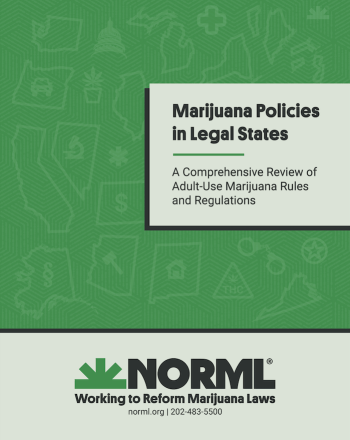WASHINGTON, DC: Today, the National Organization for the Reform of Marijuana Laws (NORML) released a new report, “Marijuana Policies in Legal States: A Comprehensive Review of Adult-use Marijuana Rules and Regulations,” examining many of the different aspects of regulated marijuana programs in the 18 states that have passed adult-use cannabis laws. The purpose of this report is to educate decision-makers at the state and federal level on the common features of states’ adult-use marijuana legalization laws and regulations so that they can make informed decisions on cannabis policy and better understand how existing state-licensed programs are successfully being implemented in jurisdictions throughout the country.
“Despite the continued expansion of regulated adult-use cannabis markets and overwhelming public support for ending cannabis prohibition, many elected officials are still relatively unfamiliar with the specific policies that states have implemented over the last decade or with the lessons they have learned,” said NORML Political Director Morgan Fox. “We are releasing this report in anticipation of a vote on the Marijuana Opportunity, Reinvestment, and Expungement (MORE) Act in the US House of Representatives and ahead of the impending introduction of the Cannabis Administration and Opportunity Act in the Senate, which will put a spotlight on cannabis policy reform and jumpstart conversations at all levels of government on how to best regulate this substance to ensure justice, efficacy, and public safety.”
State-level marijuana legalization policies are rapidly evolving in jurisdictions nationwide. Currently, 18 states have moved to regulate adult-use marijuana markets, and many others are considering enacting similar policies. Campaigns are currently underway to put both adult-use and medical marijuana ballot initiatives before voters in several states in November. Implementing adult-use legalization is an opportunity for lawmakers to significantly improve criminal justice and facilitate restorative justice, while also providing job creation and tax revenue via the regulation and oversight of what was formerly an entirely unregulated, underground, and pervasive marketplace.
“States have fulfilled their roles as laboratories of democracy, and in this case, the experiment has proven to be a resounding policy success,” NORML’s report concludes. “The number of states enacting legalization as an alternative to marijuana prohibition is growing, and public support for these policies is at an all-time high, including in early-adopter states. The success and popularity of these policies are due in no small part to the fact that legalization has been carefully crafted by lawmakers and regulators in a manner that addresses common health and safety concerns and that seeks to provide common sense market controls.
“At the federal level, Congress needs to respect these state policy decisions and remove existing barriers that only serve to disrupt these efforts. To this end, Congress must remove marijuana from the Controlled Substances Act, take actions to expunge previous offenses, and create programs that seek to address and repair the damage done to communities as a result of the failed policy of cannabis criminalization. The Administration needs to release individuals incarcerated for nonviolent marijuana offenses and have its relevant agencies work with adult-use state governments and stakeholders to ensure a smooth transition for the eventuality that the federal regulation of marijuana will likely soon become reality.”











